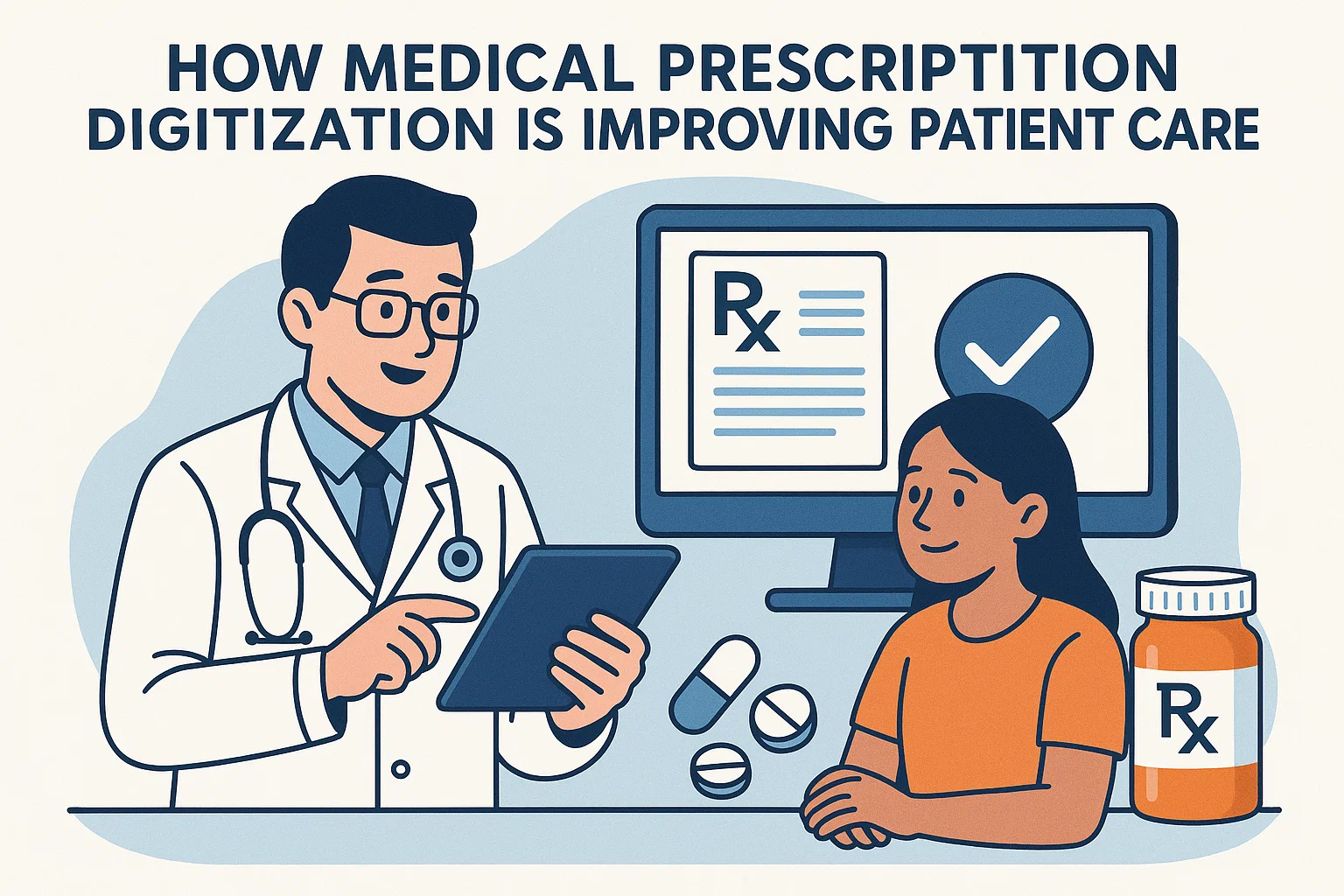Introduction
The healthcare sector is rapidly embracing digital transformation, and
medical prescription digitization is one of the most impactful innovations. Traditional handwritten prescriptions often lead to misinterpretations, errors, and delays in patient care. By leveraging
AI document processing services and
intelligent OCR software, healthcare providers can eliminate these challenges and ensure accuracy in medical data handling.

In addition to improving patient safety, prescription digitization also plays a crucial role in
healthcare claims processing AI,
pharmacy automation, and
electronic health record (EHR) management. This blog explores how digitizing prescriptions is transforming patient care and why it is essential in today’s healthcare landscape.
What Is Medical Prescription Digitization?
Medical prescription digitization refers to converting handwritten or printed prescriptions into structured digital formats using
AI-powered document processing tools. The process involves:
- Scanning the Prescription – Using OCR technology to capture text.
- AI-Based Interpretation – Identifying drug names, dosage instructions, and patient details.
- Data Validation – Cross-checking extracted data against medical databases to avoid errors.
This transformation not only reduces manual work but also ensures accuracy and speed in dispensing medications.
Why Traditional Prescriptions Are Risky
Handwritten prescriptions pose several challenges:
- Illegible Writing: Leads to misinterpretation of medicines and dosages.
- Human Errors: Manual data entry errors can compromise patient safety.
- Paper Loss: Physical prescriptions can be misplaced, causing delays in treatment.
- Insurance Delays: Manual submission of prescriptions slows down healthcare claims processing.
Medical prescription digitization addresses all these issues, making the process seamless and reliable.
How AI and Intelligent OCR Power Prescription Digitization
- Intelligent OCR Software: Recognizes complex handwriting, abbreviations, and multilingual prescriptions.
- AI for Contextual Understanding: Differentiates between similar drug names and verifies dosage accuracy.
- Integration with Pharmacy Systems: Automates inventory checks and prescription refills.
- Cloud Storage & Security: Ensures prescriptions are stored securely for compliance and future access.
When integrated with
AI document processing services, the system becomes highly accurate and scalable, ideal for hospitals, clinics, and pharmacies.
Benefits of Medical Prescription Digitization for Patient Care
1. Enhanced Accuracy
Automated digitization eliminates interpretation errors, ensuring that patients receive the right medication in the correct dosage.
2. Faster Service
With AI automation, prescriptions can be processed in seconds, reducing waiting times at pharmacies and hospitals.
3. Improved Compliance
Digital prescriptions ensure adherence to medical regulations, reducing the risk of fraudulent claims or malpractice.
4. Better Record Management
Digitized prescriptions can be linked to patient EHRs, allowing doctors to monitor medication history and avoid drug interactions.
5. Cost Efficiency
Automation reduces administrative overhead, cutting down costs for healthcare providers and insurers.
Applications Across the Healthcare Ecosystem
- Hospitals & Clinics: Automates prescription workflows, improving efficiency.
- Pharmacies: Ensures accurate dispensing and better inventory management.
- Insurance Companies: Streamlines healthcare claims processing AI for faster reimbursements.
- Telemedicine Platforms: Enables doctors to issue secure e-prescriptions instantly.
Integration with Other AI-Powered Solutions
Prescription digitization works best when combined with:
- Healthcare Claims Processing AI: Ensures claims are processed without manual verification.
- Vendor Onboarding Automation: Helps integrate medical suppliers and pharmacies faster.
- KYC Verification Automation: For patient identity verification during digital prescription issuance.
- AI for Energy Utility Bills: Ensures hospitals manage costs efficiently by automating all document workflows.
Challenges and How AI Overcomes Them
- Complex Handwriting: Intelligent OCR handles variations in handwriting.
- Drug Name Similarities: AI-based contextual analysis minimizes confusion.
- Data Security: Encryption and compliance frameworks like HIPAA ensure data privacy.
Future of Prescription Digitization
- Blockchain Integration: For secure and tamper-proof prescriptions.
- AI-Powered Drug Recommendations: Automated alerts for allergies and drug interactions.
- Voice-to-Text Prescriptions: Doctors can dictate prescriptions, and AI will digitize them in real time.
Conclusion
Medical prescription digitization is revolutionizing patient care by reducing errors, improving efficiency, and enhancing safety. By integrating AI, OCR, and automated workflows, healthcare providers can deliver faster and more accurate services.
Discover how Makez.ai can simplify your document workflows and accelerate customer onboarding—securely and at scale. In addition to improving patient safety, prescription digitization also plays a crucial role in healthcare claims processing AI, pharmacy automation, and electronic health record (EHR) management. This blog explores how digitizing prescriptions is transforming patient care and why it is essential in today’s healthcare landscape.
In addition to improving patient safety, prescription digitization also plays a crucial role in healthcare claims processing AI, pharmacy automation, and electronic health record (EHR) management. This blog explores how digitizing prescriptions is transforming patient care and why it is essential in today’s healthcare landscape.